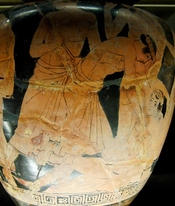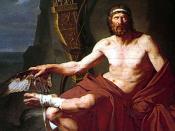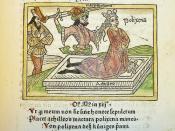Denise R Morgan (1) Western Literature December 10, 2000 Philoctetes by, Sophocles This is a story about a man who had been deceived. I am going to explore the image of false friendship that is portrayed in this story. I am also going to examine the image of Philoctetes's bow.
This story is about Neoptolemus a man who pretends to be a friend to Philoctetes. Neoptolemus is in the service of King Odysseus. The king wishes to prevent the fulfillment of an omen, told to him by a seer. The seer said that Philoctetes will, "come of your own free will to plains of Troy, where you shall meet the son of Asclepius, our comrades, and shall be eased of this malady; and, with this bow's aid and mine, shall achieve the capture of the Ilian towers"ÃÂ. (215).
Odysseus had sent Philoctetes to the island of Lemnos. Philoctetes had an ulcers on his foot, which caused him incredible amounts of pain, "with his ill- omened cries he filled the whole camp continually, shrieking, moaning."ÃÂ
(183). The camp had apparently become sick of his painful cries, so they sent (2) him away like an unwanted pet.
It was Odysseus's idea to trick Philoctetes into going with them, instead of by force. Neoptolemus was an honest man who did not believe in trickery to get something. In the process of his trickery Neoptolemus became sincerely concerned for Philoctetes. He did not like what he was doing to him and would have rather taken him in an honest manner. There are several references in the text that re-enforce this, "I am ready to take the man by force not fraud."ÃÂ(185),"ÃÂYou think it is no shame then to speak of falsehoods?"ÃÂ(186) these are just a few examples.
Philoctetes had already been an untrusting person. He is known for not trusting anyone, "If anyone advises you, speaking with good will, you hate him, deeming him a foe that wishes you ill."ÃÂ(214/215). Being the person that he is, he did not trust Neoptolemus when he first met him. Neoptolemus earned Philoctetes's trust when he told him what the King Odysseus had done to him. Neoptolmus made up a story, as the king had instructed him to do. He told Philoctetes about when his father had died and how Odysseus had given his arms to "another man"ÃÂ(191). Odysseus had told him, "you shall never carry those arms back to Scyros."ÃÂ(192). Now that the two men had something in common Philoctetes felt that he could trust him.
(3) At this point in the story Philoctetes and Neoptolemus went into the cave were Philoctetes had been living, so he could rest his foot. When they were resting, Philoctetes had entrusted Neoptolemus with his "famous bow"ÃÂ(198), "take this bow of mine, I pray, as you asked me just now, and keep it safe until this present access of my disease has pasted."ÃÂ(201). This honest show of trust is a turning point for Neoptolemus. After that, his deception seemed to bother him more and more.
After an incident occurred were Philoctetes had wished he was dead, "Death, when I am thus ever calling you, day by day, why can you never come?"ÃÂ Neoptolemus swears that he will not leave without him. When he awakes from his rest Neoptolemus tells him that he has been untruthful and doesn't know what to do. This confuses Philoctetes, as it would anyone.
"Must I be found twice a villain, by disloyal silence as well as by shameful speech?"ÃÂ which is only more confusing. As Philoctetes becomes angry at all his questions are be answered with never ending riddles he demands his bow returned, "Restore my bow at once!"ÃÂ(205).
When Neoptolemus refuses to return the bow Philoctetes realizes that he should have trusted his first instinct, and not trusted him. Now the king arrives and demands Neoptolemus to, "Seize him"ÃÂ(207). Philoctetes reminds the king (4) that he has, "long been dead"ÃÂ(207) to him. Therefore, now that the king has messed with Philoctetes's mind for a little while he decides to let him stay there and suffer. "Perhaps your treasure will be me to the honor which ought o have been your own."ÃÂ(208).
Now that Philoctetes has been robbed of his bow, confused and deceived he is left to rot away. The Chorus does not want to leave him alone, but he insists. He only asks them for one favor before they leave him, "A sword if you can find one, or an axe, or any weapon - oh , bring it to me!"ÃÂ(211). As I'm sure anyone would the Chorus wondered why he wanted a weapon, "What rash deed would you do?"ÃÂ(211). Philoctetes intended to kill himself. Is this what ultimately becomes of lies and deceits? Philoctetes's bow is obviously, what he sees as his source of power. Along with his disease and his horrible image of the world, he has given up.
Odysseus spots Neoptolemus attempting to return to Philoctetes had been left.
He was trying to return Philoctetes's bow to him, "To undo do the fault I committed before."ÃÂ(211). Odysseus was going to stop him, but Neoptolemus's lack of fear scared him. When he goes to return the bow Philoctetes doesn't trust him, I wouldn't either. When Odysseus shows up to stop him from returning the bow Philoctetes goes to shoot him. Neoptolemus (5) shows a sign of his sincerity by telling him that he is better than that, "It suits not with my honor, nor yours."ÃÂ(214).
The image of the bow as it relates to the authority is can be seen easily.
Philoctetes has the bow and king Odysseus wanted the bow, just not enough to be killed for it, the other authority, the omen (fate), says that Philoctetes will use the bow to bring down Troy. The image of false friendship as it relates to the authority is that the king, who is one authority, orchestrated the lie. The other, the omen had to make the omen come true some how.





